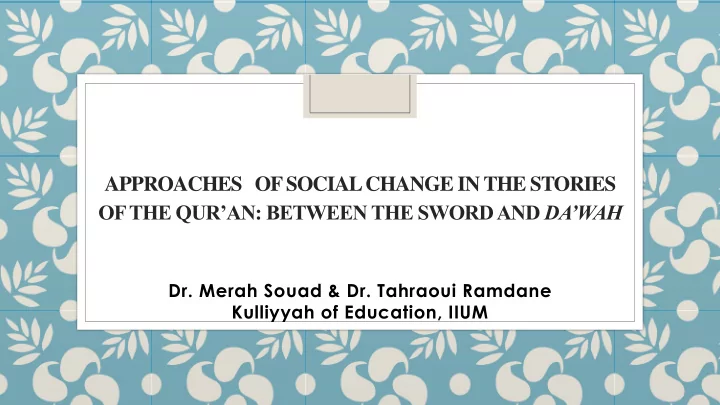

APPROACHES OF SOCIAL CHANGE IN THE STORIES OF THE QUR’AN: BETWEEN THE SWORD AND DA’WAH Dr. Merah Souad & Dr. Tahraoui Ramdane Kulliyyah of Education, IIUM
INTRODUCTION ◦ Social change is o ne of the issues, which always preoccupied the human mind . ◦ It also dominated and directed the way human thought treats matters related to human life.
Social Change in The Qur’an ◦ Looking into Qur’an -which is the central text of the Islamic faith- many models of social change have been presented as a guidance to prophet Muhammad, who was in the midst of establishing a new society -at the time of revelation- and to all mankind after him .
◦ Changing the individual represents the corner stone of change in all religions because the idea of the religious being, who enjoys noble qualities, like truthfulness, trustworthiness, straightness, integrity, is the foundation, which is considered essential by all religions, in order to create real change within societies.
◦ The Qur’anic stories emphasized on the idea that social, political, and cultural conditions provide the ideal background for any potential social movement as most movements started as a reaction to the breakdown of norms related to tawhid , such as justice, freedom, and social equality.
Foundations of Social Change In Islam ◦ The Role of the Individual: { Verily never will Allah change the condition of a people until they change it themselves (with their own souls) } [Qur’an 13: 11]. ◦ The Islamic world view considers change as act of man which must be initiated by humans themselves. The averse sets aside any type of reliance, and charges people with their full responsibility to determine their fate by their own hands.
◦ Group Work (Masses) ; Islam is the first school of social thought that recognizes the masses to be the basis, the fundamental and conscious factor in determining history and society, not the elect as Nietzsche thought, not the aristocracy and nobility as Plato claimed, not the great personalities as Carlyle and Emerson believed, not those of pure blood as Alexis Carrel imagined, not the priests or the intellectuals, but the masses .” (Sayyid Qutb, Khasais al-Tasawwar al-Islami wa Muqawamatuhu, 1983), 328
◦ Consciousness; the consciousness of the masses comes into existence, not due to material economic conditions which then create their distinction from the rest who live in incompatible conditions with the masses (the class struggle) as the Marxists claim, but the consciousness of people according to the Islamic perspective comes into existence through education in general and the pursuit of knowledge (learning) in particular. “In this respect, knowledge would engender istiqamah (integrity) in his (man) heart and mind. Integrity, that is by reason of rightness of conduct and behaviour.” (Sayyid Qutb, Khasais al-Tasawwar al-Islami wa Muqawamatuhu, 1983), 328
◦ Leadership; change in the Qur’anic stories is the one that is radical, comprehensive and is that distinctively led by a prophetic movement or inspired leaders, who are, according to the Qur’anic expression ‘faithful’ and ‘God fearing’ individuals. The Qur’anic story focuses also on the important role of the leader in the process of change.
◦ Thinking and Action: Thinking and action are doubtlessly the moral and the physical tools of change; it is not possible for the ideation of change to happen without action. In fact, the human being is the only natural gateway to change the society in the Islamic conception. (Syed al-Khatib, Sunan al- Tagh’ir 1995, 19.)
◦ Role of Education: “ In Islam, education is is the integral preparation of the good, dutiful, and wholesome I ndividual” (Tahraoui Ramdane 2011) ◦ We cannot hope to change human life, and society, without a significant change in the human nature itself… what we need today, is a profound change in man’s way of life, we help to secure the future only, to the extent to which we are ourselves changed. This self-change, is not automatic; it is the response to the meaningful pattern, we discern in history. It is a submission of the self to reality; it is a practice of religion. (P. Radhakrishnan, Religion and Sociology,1956), 10.)
◦ Jihad (Armed Struggle); Throughout the stories of the Qur’an, there was no reference to the usage of power or any kind of military might in the course of their da’wah (call). The usage of wisdom and education continued to be the main method of change. ◦ Even by looking at the styles of confrontation in the stories of the Qur’an, it is clearly observed that any confrontation between the prophets and their opponents is normally short and swift, and peaceful even when the events of the stories escalate. The Divine intervention which settles the conflict makes this confrontation brief and swift.
Conclusion Social change in the Qur’anic stories mainly took the form of revolutionary movements, radical and comprehensive, led by prophets and inspired leaders. It aimed to establish a new social order based on the idea of tawhid . There are few exceptions where social change took the form of reforms; however, the aim was not to create new social situations, but to change some aspects of the social, political, and economic structure of society.
Thank you
Recommend
More recommend